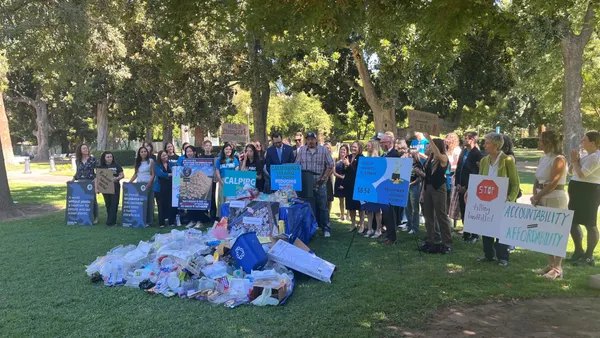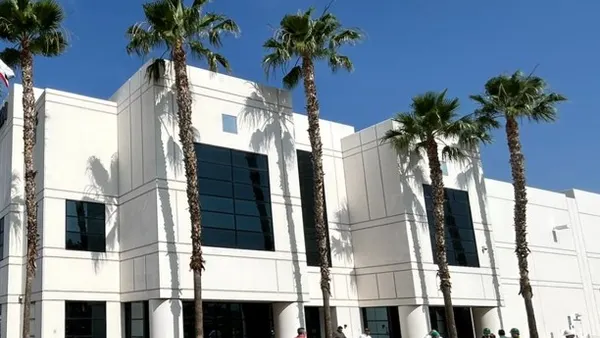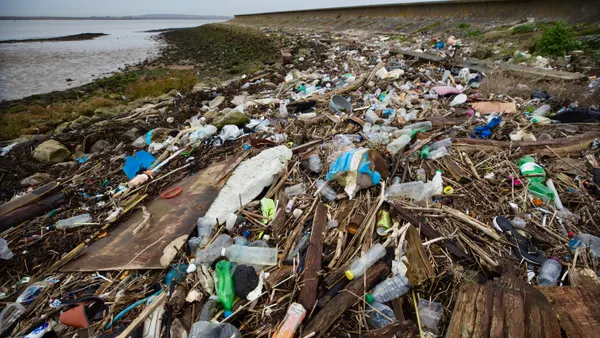Dive Brief:
- Industry stock prices tumbled yesterday when Stifel analyst Michael Hoffman downgraded almost all of the publicly traded service providers to "hold" after an extended period of recommending "buy," as reported by The Fly and Seeking Alpha. China's new trade policies were cited as a key factor, along with lingering effects from multiple hurricanes in Q3. Hoffman projected that China's effects on commodity prices could continue into Q4 and 2018.
- The news drove shares of Waste Management down by 3.7% and Republic Services by 4.9%. Casella Waste Systems saw prices drop even further, by nearly 7.9%. Advanced Disposal, seen as one of the most affected by the hurricane season so far, was down by 3.7%.
- The only company that Stifel didn't downgrade was Waste Connections, because of its "unique market selection" and maximization of contract structures. Better than usual cash flow growth, which could lead to additional acquisitions, was projected for the company over the next two to three years. As a result, Waste Connections prices only went down by 1.3%.
Dive Insight:
China's import restrictions and trade plans have been on the industry's radar all year, with awareness ratcheting up since a ban on dozens of material categories was announced in July. Rigorous contamination specifications and a drought of import licenses have raised the stakes even higher. Throughout all of this, details have often been vague and reactions have ranged from abject worry among trade associations to more measured comments by the publicly trade companies.
During the latest round of earnings reports in July, the companies sought to downplay China's effects — or said it was too soon to tell what would happen. CEOs from Waste Management, Republic, Waste Connections, Advanced and Casella all cited their own reasons to be positive about recent growth, including the fact that recycling revenues comprise a relatively small portion of their overall business. More recently, Waste Management CEO Jim Fish told Waste Dive that China's trade policies could affect "all U.S. recyclers" but predicted the effects would be temporary. Whether Fish or any of his fellow CEOs are now feeling differently after the stock drop will become more clear during Q3 earnings reports at the end of this month.
According to Hoffman, during a Sept. 26 presentation at WASTECON in Baltimore, Waste Management is the most exposed of the group with roughly 10% of its revenue tied to commodities. For Republic that figure was estimated to be around 5.5%, and for the other three it was closer to 2.5%. Republic will soon be even more involved in the recycling sector after announcing plans to acquire ReCommunity. Regardless of the percentage, the recent drop in OCC and paper prices was projected to create "a meaningful revenue hit." Until recently, those were some of the most profitable commodities found at the curb and, even if imports eventually increase, prices may not return to their previous peaks. While the companies have now shifted many of their contracts to less risky models with revenue-sharing or sustainability fees, it's still possible that they could seek to increase collection costs in the future as a result.
As for the recent hurricanes, which were particularly disruptive for the companies based in Texas and Florida, short-term expenses could eventually be offset by longer term opportunities as rebuilding begins and yields new construction debris. Though with the Gulf Coast now on watch for potential effects from Hurricane Nate, it's clear that the immediate effects of hurricane season may not be over. Combined with the equally unpredictable effects of China's trade policies, it looks like the industry could experience a more challenging end to the year than previously expected.










